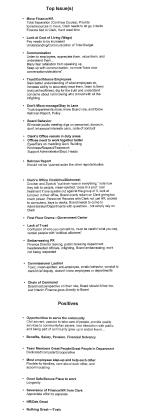The wait was over on Wednesday as John Scholten, regional president of the Michigan Leadership Institute, presented the results of the organizational culture survey that the board of commissioners hired him to prepare in November. Almost every seat in the large board of commissioners meeting room was occupied by members of the public and staff from many county departments.
The report was like the early stages of therapy in the opinion of commissioner Jamie Kramer: “It’s gross, It’s ugly, It hurts, and it doesn’t feel good.” But by bringing some of the underlying issues contributing to the resignation of many county employees to the surface, she said they can now address them.
The county board contracted the MLI for $6,500 on Nov. 6 to perform the survey, with former Glen Lake Superintendent John Scholten of the MLI coming to the government center for three days to invite employees to one-on-one interviews. In these meetings, he encouraged them to talk candidly about the positive and negatives about working for the county.
Through these face-to-face surveys and an online form, 85 of 117 county employees participated in this study. As an indicator of the overall environment, Scholten asked these employees to rate the work culture on a scale from one to 10, with one being broken and 10 being healthy. Scholten said the average score was a “concerning” 3.8.
To encourage employees to clearly identify the challenges facing the county without fear of reprisal, they were granted anonymity for the survey. Scholten presented a summary of the most common responses to his questions.
The county clerk’s office appears to have received much criticism from employees in other departments. According to Scholten, employees complained about inequality of pay, with three employees — clerk Michelle Crocker, deputy clerk Jennifer Zywicki, and interim finance director Cathy Hartesvelt — receiving stipends for taking on finance duties, while other staff do extra work without additional pay.
Moreover, Scholten said that survey respondents identified Crocker and Zywicki as “vindictive and somewhat dishonest” and sources of drama in the government center and high staff turnover. In many cases, this was probably tied with another point: the need, in some employees’ eyes, to “pull off the Band Aid” and fully separate finance and human resources duties from the clerk’s office.
After unusually little discussion, the previous county board stripped control of county finances and HR duties from the clerk’s office in May 2021 and assigned the duties to new departments. This decision was not only controversial but poorly planned, according to some current commissioners. And in the opinion of some employees — and an assessment by the county’s advisory firm Rehmann from the middle of last year –—many finance and HR controls remain in the clerk’s office.
Another person who was called out by name was county commissioner Melinda Lautner. Lautner was vocal in her opposition of conducting this survey in the first place, feeling that awarding the contract to MLI before the board’s monthly regular meeting in November circumvented the process. Lautner was apparently characterized as “toxic, mean-spirited, anti-employee, (having) erratic behavior, conduit to the clerk/chief deputy (clerk), doesn’t know employees or departments,” according to the report.
But the entire board received criticism from employees for showing an apparent lack of leadership. They also are relying too heavily upon and favoring the clerk’s office where they should be coming to other departments with questions, employees said. This extended to county administrator Deb Allen, who received criticism for not having an open door and not providing “code of conduct” training. Though employees also said that the administrator lacks support from the board of commissioners to do this effectively.
At the same time, there were feelings among county employees that the board was not “staying in its lane,” with elected officials — which includes both the county commissioners and the clerk — stepping over boundaries. Moreover, Scholten identified a “dangerous” perception that employees cannot “touch” elected officials. Scholten encouraged the board to pursue governance training moving forward so they can better understand their role.
Other common complaints included employees’ pay being too low to pay the cost of living in Michigan’s wealthiest county – a problem that Scholten said he wasn’t certain that the county’s coffers are capable of redressing, but he said they need to “show that you’re working with and doing the best you can do with their wages.”
Since these results were presented at a committee of the whole meeting, the board of commissioners could not take any action on them. But after the meeting, county board chairman Ty Wessell told the newspaper that the board will start working on acting on these survey results at their next executive session on Jan. 9. In his opinion, this will be their “number one issue of the year.”
- Log in to post comments


